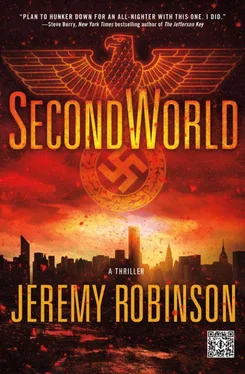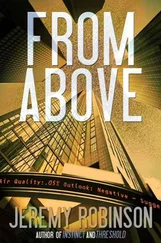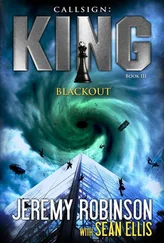With a shake of his head, Miller turned to the man behind the desk. The man turned away quickly, looking at random papers on his desk in an attempt to hide his eavesdropping.
“Cancel the cab,” Miller said.
The man’s neck jiggled when he nodded. “Are you really him?”
Miller just turned away and headed for the door. Brodeur followed.
“I take that back about you being arrested,” Brodeur said. “Everyone knows who you are, now. You’re a celebrity.”
Miller exited through the large glass doors at the front of the hospital. He stopped on the sidewalk as a breeze carried a waft of fresh air over his body. He breathed deep, intoxicated by the smell, by the feel of it in his lungs. He would never take it for granted again.
When Brodeur stopped next to him, Miller said, “A celebrity is someone people wish they were. No one wants to be me. Trust me. Where’s your car?”
“No idea,” Brodeur said. “I tend to misplace things.”
Miller felt like slugging Brodeur, but held off when the man took out his keychain and pushed a button on a car alarm transmitter. A honk sounded in the distance. “Thataway.”
Brodeur led the way, honking the horn every ten seconds, honing in on the vehicle like a dolphin using echolocation. When they reached the car, Miller debated taking the keys from Brodeur and leaving him behind, but the man was just doing his job.
While Brodeur opened the driver’s side door and climbed in, Miller looked back at the hospital. He found the fifth floor and followed the windows to the room he thought belonged to Arwen. It all seemed so normal. So simple. The hospital. The blue sky. It was hard to imagine that while part of the world had been transformed into hell, the rest was business as usual. He kept expecting red flakes to fall from the sky, or for the hospital to explode, or for a sniper bullet to find him.
When the doors unlocked, Miller jumped. Relax, he told himself. Get a grip.
After getting in the car and hitting the road, Miller discovered that his assessment of the world outside the Miami area was drastically incomplete. The world was anything but normal. In the fifteen minutes it took to get to his apartment they witnessed two stores being looted, several fights, and a standoff between a mob and D.C. police in riot gear.
When they turned onto Miller’s street, he was glad to see it looked no different than the last time he’d seen it, nearly two weeks previous. Brownstone apartment buildings lined both sides of the street, most of which were concealed behind twin lines of maple trees heavy with green leaves.
“It’s this one,” Miller said, pointing to his building.
Brodeur pulled over.
“You don’t have to stay,” Miller said.
“You have your orders, I have mine,” Brodeur said. “Won’t be the first night I spent in a car.”
“You’re staying in the car?”
“Can’t keep watch as well from the inside.”
Miller knew he was right, but it still felt odd, having someone watch over him. He opened his door. “You sure?”
“Go,” Brodeur said. “Sounds like you’re going to need as much sleep as you can get.”
“Thanks.” Miller stepped out of the car and closed the door. He offered a nod and casual salute, and limped toward his front door. He strode up the granite stairs leading to the front entry of his building. He had planned to buzz a neighbor to let him in, but found the front door wedged open. The tenants sometimes did this if they were moving a mattress or TV, but no one was around. Assuming someone had just forgot, he kicked the rock away and let the door close behind him.
His pace quickened as he took the stairs toward his third-story apartment. It would feel good to just sit in his chair, which had conformed to the shape of his body. He took the last flight of stairs two at a time, working out his game plan: ibuprofen, shower, beer, chair, think, second beer, go to bed. As soon as he reached his door, the plan became moot. It would have to wait for another day.
The door was open.
Miller reached under his left arm, looking for a gun that wasn’t there. Shit, he thought. He listened for several seconds, and after hearing nothing but the loud hum of his old refrigerator, slid into the apartment. Two steps into the apartment he saw that it had been tossed. The contents of every drawer and cabinet covered the floor. Paintings lay broken and torn. Cushions sat gutted.
At the center of it all, in the living room, stood a petite blond woman, gun in her hand and blood on her arm.
Several options shot through Miller’s mind. He could retreat and get Brodeur, who was armed. But that wasn’t really his style. And the game could change by the time they got back. She might be watching the door, or have exited out the back. Leaving wasn’t a viable choice. He had to take care of this here and now.
His way.
The woman held something in her free hand and was inspecting it closely. No way she’s a pro, Miller thought. She’d left her back to the entrance and was totally ignorant of her surroundings. Still, she was holding a 9mm Glock and the blood on her arm suggested she knew how to use it.
Miller stepped quietly through the detritus littering the hardwood floors. With adrenaline fighting his fatigue, he managed to slide up behind the woman. Close up, he noticed a large purse at her feet.
Who brings a purse to toss an apartment?
Her clothes were all wrong, too. She wore tight-fitting jeans that showed off her short, but fit legs. Her red shoes looked like fashionable cross-trainers. And combined with her untucked white blouse and red, flowery purse, she looked like some kind of office employee on casual Friday.
Still, there was the gun.
A problem he would soon fix as he moved to within four feet of the woman. Close up, he could see that she was looking at the Purple Heart medal he’d been awarded for the greatest failing of his Navy SEAL career. He held his breath, pictured every move he’d make, and then acted. With one long step he closed the distance between them. He grasped the gun with his right hand and twisted, while with his left, he shoved her hard in the center of her back. The woman fell forward with a shout. The gun came free.
Miller turned the gun on the woman and took aim at her head.
She landed on the floor and spun around quickly. Her straight blond hair clung to her face, which looked wet. Through her hair, Miller saw her eyes, red-rimmed and wide. The woman was terrified. Not only was she not a pro, she wasn’t even a killer.
“Who are you?” Miller lowered the gun a notch.
And then she spoke.
“Please, don’t shoot me. I’m not your enemy.” The request was simple enough, but every syllable she spoke held the unmistakable sharp sound of a German accent.
The gun came back up. “Bullshit.”
“Please,” the woman said, shrinking back.
“Who did you shoot?”
The woman looked confused. “No—no one.”
Miller squinted at her. His logic said she was lying. After all, the last German he’d encountered had nearly killed him, and she had been standing in his ransacked apartment with a gun. But her eyes, blue and wet, looked honest. He quickly ejected the clip and looked at the bullets. Full. There wasn’t even a round in the chamber. He slapped the clip back home and smelled the gun. If it had been fired recently and reloaded, it would still smell strongly of cordite.
He smelled nothing. Either the woman had reloaded and cleaned the gun, or she was telling the truth.
“Whose blood is that?” he asked, pointing to her arm.
She looked down at the blood, her eyes widening as though she’d seen it for the first time. With a shaky hand, she wiped at the dry blood, but it wasn’t going to come off without soap and water.
Читать дальше












